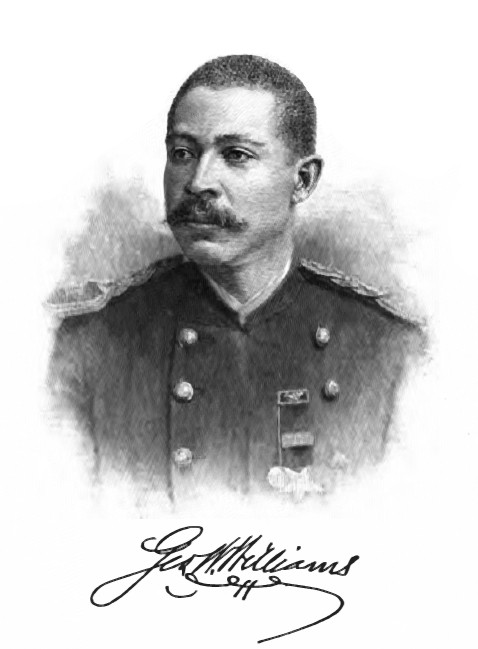
George Washington Williams (19th Century Black Historian and Originator of the term “Crimes Against Humanity”)
George Washington Williams (October 16, 1849 – August 2, 1891) was a soldier in the American Civil War and in Mexico before becoming a Baptist minister, politician, lawyer, journalist, and finally, becoming the most important writer on African and African-American history in the 19th century. Williams was the first to use the term “crimes against humanity” when he described the atrocities perpetrated by King Leopold’s regime running the Congo at that time, which resulted in millions of deaths.
Williams was born free in 1849 in Bedford Springs, Pennsylvania, to two African Americans, Thomas, a laborer, and Ellen Rouse Williams. He was the oldest of four boys. Although there were limited educational opportunities at that time for Blacks, Williams nonetheless learned barbering, a skill that was an advantageous trade at that time. During the American Civil War, Williams ran away to enlist at the age of 14 in the Union Army under an assumed name; he fought during the final battles of the war.
After the war, Williams went to Mexico and joined the Republican Army under the command of General Espinosa, the Mexican general who was fighting to overthrow Emperor Maximilian and French rule. He was commissioned as a lieutenant, learned some Spanish, and earned a reputation as a good gunner. He returned to the U.S. in the spring of 1867.
In the United States, Williams continued his military career, enlisting for a five-year stint in the Army. Assigned to the 10th Infantry (made up of Black Calvary), which served in the Indian Territory, he was wounded in a lung in 1868. Williams was hospitalized until his discharge that year.
After returning to civilian life, the young veteran decided to attend college. He was accepted at Howard University, a historically black college in Washington, DC, but did not stay long. In 1870, Williams began studies at the Newton Theological Institution near Boston, Massachusetts, even though he was barely literate and with no formal education. Williams graduated in 1874 and emerged a polished speaker and writer.
His considerable abilities on the podium and with the pen carried him to several arenas:
-Williams was a pastor in The pulpits of the most prestigious black churches in Boston (including the historic Twelfth Baptist Church of Boston), and Washington DC. While serving as a pastorate in Washington, DC, Williams gained support from many of the leaders of his time, such as Frederick Douglass and William Lloyd Garrison, Williams founded The Commoner, a weekly journal. (This had no relation to William Jennings Bryan’s LATER publication of the same title). Williams published eight issues.
-Williams was a path maker in The halls of the Ohio Legislature, wherehe became the first African American elected to the Ohio state legislature, serving one term from Cincinnati for 1880 to 1881. In 1887, Williams was given an honorary doctorate of law by Simmons College of Kentucky, a historically black college, where he spoke at a commencement ceremony.
-Williams came close to becoming a minister representing the United States internationally. The appointment as American minister to Haiti went to Frederick Douglass instead.
-And finally, Williams traveled to Europe, and finally Africa, where he was contracted to write articles for SS McClure Press, and to interview Leopold II, King of the Belgians, who ‘allegedly’ wanted to increase economic development in the Congo (the so-called economic development turned out to be one of the greatest human exploitations the world had ever seen up until that time). Williams’s trip was paid for by the railroad magnate Collis P. Huntington, one of the richest and most powerful men in the United States.
After having been impressed by meeting King Leopold II of Belgium, Williams traveled in 1890 to the Congo Free State (then owned by the king) to see its development. Shocked by the widespread brutal abuses and slavery imposed on the Congolese, he wrote an open letter to Leopold in 1890 about the suffering of the region’s native inhabitants at the hands of the king’s agents. This letter, which subsequently popularized the term “crimes against humanity”, was a catalyst for an international outcry against the regime running the Congo, which had caused millions of deaths. Leopold and his retainers publicly denounced Williams’s charges and privately spread rumors that Williams was a blackmailer or worse. Even Huntington’s patronage suddenly dried up, but Williams continued to speak and write about the ”deceit, fraud, robberies arson, murder, slave-raiding, and [a] general policy of cruelty…. While liberal missionaries and diplomats quietly watched Leopold’s agents strip native peoples of their wealth and enslave them” in the Congo. Williams was one of the first writers to bring these ‘crimes against humanity’ to the world attention.
Because of his shedding light to the world on Leopold’s evil exploitation of the Congo, Williams was deserted and left impoverished. He made it back from the Congo to as far as the west coast of England, but he did not make it back to the United States. With his health utterly broken and left destitute, Williams died in Blackpool, England in the summer of 1891. He was only 41 years old. His grave remained unmarked until 1975 when an American historian joined city fathers in laying a wreath at Williams’s last resting place. The black granite tablet that now marks his grave reads ”George Washington Williams, Afro-American Historian, 1849-1891.”
Sources: Soldier, Scholar, Statesman, Trickster (nytimes.com); George Washington Williams – Wikipedia
(1890) George Washington Williams’s Open Letter to King Leopold on the Congo • (blackpast.org);
George Washington Williams: https://www.youtube.com/watch?v=C0DFwEI3cSs
